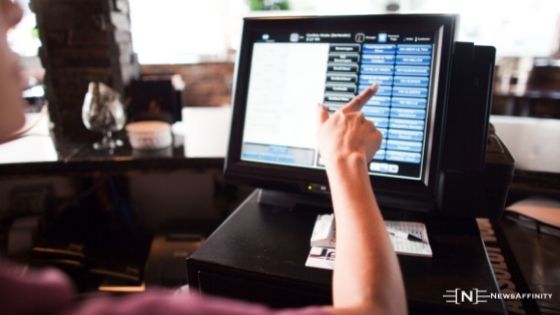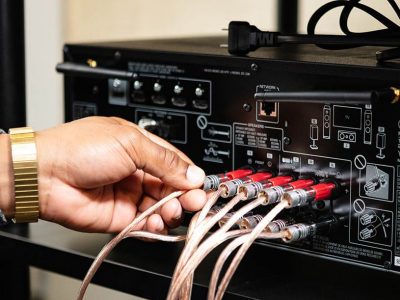Nowadays, nearly all businesses rely on a point-of-sale (POS) system to run their operations smoothly and efficiently. Overall, an estimated 68% of retailers use some form of POS system in their business. Recent technological advancements mean that POS systems offer much more than just processing payments at the checkout counter. While this can streamline many aspects of business, it can mean that choosing a POS system that suits your businesses’ needs can be a confusing task. Here are some tips to help you choose the right system for your company.
Why Do You Need a POS System?
In its most basic form, the point of sale is simply the point at which sales are completed. In days gone by, this would have come in the form of a cash register, where physical money was exchanged for goods or services.
Nowadays, the modern drive towards mobile, cloud-based solutions has led to the development of POS systems into network-connected solutions with myriad business use-cases. They are no longer a stationary affair and can easily take payments wherever a sale is made.
Another significant change has been the move away from cash-based POS systems. Modern POS systems accept various payment forms, ranging from credit card processing to debit card payments to more modern solutions like Apple Pay or Android Pay. Cashless payments have surged in popularity recently, which has likewise increased the necessity for POS systems to process such payments.
Modern POS systems allow you to take whatever payment is easiest for your customer. This can significantly reduce friction and improve customer experience throughout your business. Ultimately, an advanced POS system can result in higher sales and rates of customer satisfaction.
Additionally, modern systems are beginning to reduce some costs associated with taking payments. For example, conventional credit card payments convey a charge to businesses. However, with new systems like Nadapayments, you can avoid service charges, further increasing revenue.
How POS Systems Make Your Business More Credible and Competitive
One benefit of investing in POS systems for small businesses is that they can make your business seem more legitimate to prospective customers. Even if your company has just started, having a POS system that accepts various payment forms can improve trust and confidence in your services among new clients.
They also convey a competitive edge to small businesses. Overall, seemingly small technological advancements can significantly improve a company’s ability to move with the current trends. One area that is becoming increasingly important is EMV chip cards. These represent 85% of the credit cards issued in the United States, but just 63% of companies can process them. This disparity is indicative of an opportunity for small businesses to harness technology to gain an advantage over competitors.
Analytical Upsides of POS Systems
The modern developments to POS systems mean that the technology can help you better understand your business. Using associated software, you can analyze sales data collected by your POS system, showing trends in sales patterns.
Additionally, such analysis can help you learn about your customer base’s habits and behaviours, passively capture data about your clientele, track productivity, and manage inventory.
What You Should Consider When Choosing a POS System
There are several questions you should consider when deciding on the right POS system for your business.
The first thing to think about is the current state of your business. Whether your company is a new venture or a well-established name can make a difference to which POS system you will need. For example, suppose your company is just getting started. In that case, you will likely require an easy-to-use system that will improve efficiency but might lack detailed analytical features.
You should also consider the most prominent struggles your business faces and what a POS system could help simplify. Generally, small business owners are overworked, and it is common for them to attempt to take on too much. This can lead to slips in standards as well as the danger of burnout due to excess stress.
Modern POS systems can help small business owners without the dedicated infrastructure to simplify processes like accounting. The connectivity of these systems allows them to directly integrate with accounting software, streamlining the bookkeeping systems of small businesses. This, alongside the other benefits like improved inventory management and competitive analysis facilitated by modern POS systems, can drastically simplify business management for small company owners.
Another factor to consider is the cost of a POS system. This can be a significant sticking point for many businesses as they seek opportunities to maximize growth without breaking the bank. If you opt for a cloud-based POS system, there will likely be a tiered pricing system that depends on the number of stores, customers, terminals and features you require. By taking a close look at each tier, you can choose the one which offers the best return for your money while still delivering the features that you need for expansion.
Additionally, the scalability of a POS system should be considered. Many POS providers offer modular features, allowing you to add and remove services as and when you need them. If you manage a business and anticipate changes to its scale, a well-adapted POS system can help facilitate expansion.
POS Systems for Different Businesses
The type of business that you are managing will affect which POS system you should choose. The needs of companies vary depending on a variety of factors. For example, a physical coffee shop on the high street has an entirely different business model (and therefore needs) to a moving food truck.
If you run a more traditional form of business, i.e. a physical shop, you will likely require a standard POS set-up. This could include features like a countertop system, which would probably replace a typical cash register. Some examples of businesses that would fit this category would be retail shops or quick-serve food establishments.
Most small businesses will only need one POS terminal to meet their customers’ needs. Still, you may need multiple terminals to cope if you experience bottlenecks from rush periods with changing traffic.
For companies with a mobile business model, such as food trucks or festival caterers, then a mobile POS system will likely be best suited for your needs. With these systems, you can process payments from any location, rather than just at a service counter.
Ultimately, choosing the appropriate POS system for your businesses’ will allow you to process more payments faster. This contributes to higher customer satisfaction and a greater volume of sales during busy periods.
Conclusion
In summary, there has been a significant amount of technological development in POS systems over recent years. From analytics to integration with accounting programmes and detailed personnel and inventory management, a modern POS system can be a valuable investment for small and more established businesses alike.
Nowadays, it is possible to improve your operations in various ways using the modern solutions offered by POS providers. Generally, these can be customized to the specific needs of a company. So, whether you require a mobile, modular system that facilitates rapid expansion and connectivity or a more traditional fixed POS system to replace a conventional cash register in a coffee shop, there is a wealth of options available to you.

















Comments